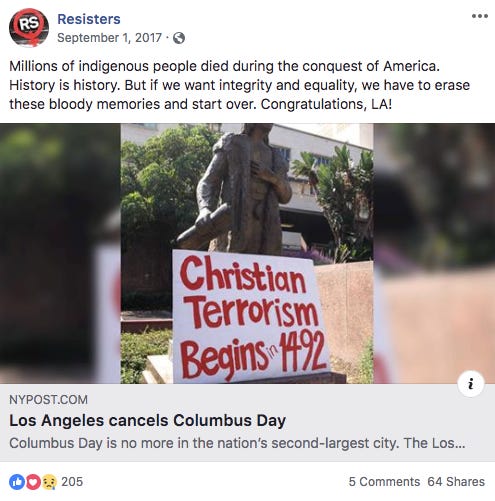Trump’s groceries
Welcome to Popular Information, a political newsletter for people who give a damn — written by me, Judd Legum. Send your feedback to judd@popular.info or tweet your thoughts using #popularinfo.
If you’ve been forwarded this newsletter, you can sign up at popular.info.
The systematic disinformation campaign on Facebook
Nearly half of U.S. adults get news from Facebook. As the midterm elections approach, tens of millions of Americans will go to Facebook to learn about the candidates and the issues.
Those Americans are also being targeted by an ongoing, systematic disinformation campaign.
Facebook says it wants to stop this activity. But is that even possible? By vacuuming up the personal information of hundreds of millions of Americans and providing advanced micro-targeting to anyone with a few bucks, it has created the ultimate playground for bad actors seeking to influence the U.S. political system.
On Tuesday, Facebook announced it “removed 32 Pages and accounts from Facebook and Instagram because they were involved in coordinated inauthentic behavior.” While Facebook did not definitively identify who was behind the effort, the company said that the activity is “consistent” with how the Russian Internet Research Agency (IRA) used the platform to manipulate voters before the 2016 presidential election.
What Facebook found
The Pages removed by Facebook produced 9500 posts which were followed by “more than 290,000 accounts.” The pages also “ran about 150 ads for approximately $11,000 on Facebook and Instagram.”
There was also an effort to move the activity off-line. “The Pages created about 30 events since May 2017… The largest had approximately 4,700 accounts interested in attending, and 1,400 users said that they would attend,” Facebook said.
Facebook only released 13 of the 9500 pieces of content produced by these Pages. (Others were published by the Atlantic Council.) Most of the material made public by Facebook appears to target the American left and minority groups.
 Facebook will not alert hundreds of thousands of people impacted
Facebook will not alert hundreds of thousands of people impacted
Facebook will only alert the 4,700 people who expressed interest in attending one of the events and not the larger group of 290,000 people that followed the fake accounts that were removed. A spokesperson told WIRED that alerting all the people who followed the Pages would be “premature.”
The purpose of the operation
Facebook flagged the 32 Pages and accounts for the Atlantic Council’s Digital Forensic Research Lab before their removal. After reviewing their activity, The Atlantic Council concluded that whoever was behind the accounts “sought to promote divisions and set Americans against one another.”
According to the Atlantic Council, it was “an attempt by an external actor — possibly, though not certainly, in the Russian-speaking world — to infiltrate left-wing American communities.” At least one of the accounts “attempted to mobilize its audience for a confrontation with the far right.”
The Russia connection
Facebook appears to be exercising extreme caution in not linking the activity announced Monday directly to Russia’s ongoing efforts to interfere with American elections. Facebook found compelling evidence tying one page to the IRA and used that connection to find the other suspect Pages.
One of the IRA accounts we disabled in 2017 shared a Facebook Event hosted by the “Resisters” Page. This Page also previously had an IRA account as one of its admins for only seven minutes. These discoveries helped us uncover the other inauthentic accounts we disabled today.
The Atlantic Council said that “approach, tactics, language, and content were, in some instances, very similar to accounts run by the Russian ‘troll farm’ or Internet Research Agency between 2014 and 2017.” One Page, Resisters, “repeatedly made linguistic errors which are uncharacteristic of American colloquial language yet characteristic of native Russian-speakers.”
One post, for example, uses the awkward phrase, “She ended the journalism.”

The tip of the iceberg
There is no assurance that Facebook has identified all of the electoral interference campaigns on Facebook, whether they are being directed by Russians or others. In its release, Facebook noted, “whoever set up these accounts went to much greater lengths to obscure their true identities than the Russian-based Internet Research Agency (IRA) has in the past.” Specifically, “they used VPNs and internet phone services, and paid third parties to run ads on their behalf.”
It was only because someone goofed and used a known IRA account that Facebook was able to surface this network.
Ben Nimmo, a Senior Fellow at the Atlantic Council’s Digital Forensic Research Lab, told me he would be surprised if there weren’t additional clusters still active on Facebook. Nimmo noted that, in the run-up to the 2016 election, the IRA targeted both the left-wing and the right-wing.
It hasn’t been definitively established that Russia was behind the accounts that were removed today, Nimmo said, and tactics can change. But Nimmo believes there are likely similar efforts on Facebook targeting right-wing activists.
“Texas in my Heart”
One example of a possible ongoing disinformation campaign that Facebook has not acted on is a page called “Texas in my Heart.”
In September 2017, Facebook removed the “Heart of Texas” page, which advocated secession and other divisive positions, saying it was part of Russian efforts to interfere in the 2016 election. Before its removal, it amassed over 250,000 followers.
But a similar page, “Texas in my Heart,” was started last May. It posts nearly identical content as the “Heart of Texas” page. “Texas in my Heart” even publishes pro-secession memes emblazoned with the “Heart of Texas” logo.

Trump’s groceries
On Tuesday night, Trump appeared in Florida to stump for Ron DeSantis, the Republican candidate for governor. During a rant about the need for voter ID — something Trump and others are pushing because it reduces turn out, especially among minorities — Trump made a very odd claim.
“If you go out and you want to buy groceries you need a picture on a card. You need ID,” Trump said.
This is a very silly thing. But it also illustrates how Trump has changed the game.In previous political climates, this statement by Trump would be considered a major gaffe that would dog him for months, if not years.
An entire campaign was waged against John Kerry, the Democratic nominee for President in 2004, because someone took a picture of him windsurfing. This picture, according to millions of dollars in TV ads, proved that Kerry was out of touch.
President George H.W. Bush, during his 1992 reelection campaign, was mocked when he visited a grocery store and appeared unfamiliar with a supermarket scanner.
Bush’s gaffe made the front page of the New York Times and was framed as a significant blow to his image.As President Bush travels the country in search of re-election, he seems unable to escape a central problem: This career politician, who has lived the cloistered life of a top Washington bureaucrat for decades, is having trouble presenting himself to the electorate as a man in touch with middle-class life.
Today, for instance, he emerged from 11 years in Washington's choicest executive mansions to confront the modern supermarket.
Trump’s gaffe will barely be noticed. It was not mentioned in the New York Times story about the event.
That is because Trump has rewritten the rules. He says outrageous things every day that would have plagued previous presidents for months. But there is no time for any issues to stick to Trump because a new day is coming and Trump will say new things.
Trump is fully aware of this dynamic and uses it to his advantage.
Supreme Court lets kids sue Trump over climate change
The Supreme Court rejected an effort by the Trump administration to stop a lawsuit brought by 21 young people, aged 11 to 22, to sue over climate change. The plaintiffs argue that the government “through its affirmative actions in creating a national energy system that causes climate change, is depriving them of their constitutional rights to life, liberty, and property, and has failed to protect essential public trust resources.”
The Supreme Court’s order called the government’s request to stop the suit “premature.” Last week, the 9th Circuit Court of Appeals also rejected the government’s request to dismiss the lawsuit.
The trial is scheduled to begin on October 29.
Thanks for reading! Please send your feedback, including ideas for future emails, to judd@popular.info. Or tweet your thoughts using the hashtag #popularinfo.
If this email just isn’t enough, you can follow me on Twitter @juddlegum.
If you like this email, please consider forwarding it to a friend. If someone forwarded you this email, you can subscribe at popular.info.

